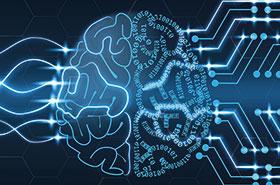

Artificial intelligence (AI) development and uptake is past the point of no return, with digital skills in key areas such as data science becoming crucial in an AI-driven economy according to data science expert, Shourjya Sanyal. In the same way as the iInternet gained critical mass and became ubiquitous, AI adoption is gaining momentum and is set to change the way the world looks over the next 20 to 30 years. Sanyal believes AI is still in its infancy in terms of impact, but that it is evolving rapidly. “Currently, we are just at the beginning of what’s possible. We’re taking baby steps, addressing the easiest problems and producing solutions most likely to appeal to consumers. But these early moves will pave the way for us to address more complex problems over the next 10 years. And in 30 years time, AI will be to the world what the Internet is today – ever present,” he says, adding that AI is bigger than the Internet, it is the final pinnacle of technology.
He says that AI will not only revolutionise daily life and work, it will actually change society, “Like the discovery of farming led to specialised jobs such as farmhands and distributors, AI will further democratise society. It will reduce the need for humans to perform repetitive, manual tasks and allow them to become innovators and experts in niche fields.”
Like the Internet, AI is eventually going to disrupt almost every industry and reduce the cost of doing business. Automation saves time, money and resources, and reduces risks such as human error and fraud. Great progress has already been made in marketing and sales for example, where automation means pre-scheduling complex customer journeys and efficiently tracking response rates and customer sentiment.
Then AI will make businesses more profitable by empowering C-level executives with better predictive analytics in terms of customer behaviour, inventory requirements and sales cycles. The first impacts are likely to be felt in industries like media, legal, finance, travel, retail, manufacturing and healthcare.
However the road to Utopia, in which AI takes on the hard labour and allows humans to focus purely on creation and innovation, could be paved with challenges. There are concerns about the potential negative impacts of AI on jobs, particularly in developing countries. Other negative impacts include a tendency towards blindly depending on AI for corporate decision-making. But Sanyal believes that the long-term gains of an AI-enabled world outweigh the challenges.
AI demands data science upskilling
To prepare for the inevitable change, businesses should upskill their talent pools now and prepare for the potential of AI in their sectors; and data science is at the heart of this challenge. Organisations should be cultivating an atmosphere where analytical thinking is celebrated. This will enable employees to better portray their challenges to the data science team.
With data science effectively at the heart of operations, organisations can immediately start addressing the low-hanging fruit and overcome challenges. Companies need chief innovation officers who work closely with a team of data scientists to chart out all the internal and external data sets available to the organisation. The next logical step is to identify the problems that can be solved in the shortest amount of time using the available data. This will help organisations take on board more challenging problems in the longer term, including predicting the behaviour of new customer segments.
Governments for example, like large businesses, are facing challenges when it comes to gaining an efficient understanding of citizen satisfaction, inventory management and optimisation of resource allocation. A data scientist team empowered by AI will be a strong capability for any government department of the future.
But upskilling goes even further than data science. In South Africa, where digital skills resources are limited, upskilling in digital innovation is tremendously important. It must be taken into consideration immediately to ensure organisations have the skills and knowledge to compete in an AI-driven economy. Training providers like Digital Skills Academy, which provides high level degree programmes, professional diplomas and short courses in digital innovation, are a wonderful opportunity for individuals and businesses alike to develop the necessary skillset through specialisation courses in data science or programming for big data. Digital Skills Academy’s Professional Diploma in Digital Innovation provides such specialisation modules. But most importantly, the 15 week, online and part-time programme equips participants with the digital mindset and transformational knowledge required to future-proof a career in the digital economy.
For more information contact Rebecca Beaty, Digital Skills Academy, rebecca.beaty@digitalskillsacademy.com, www.digitalskillsacademy.com
© Technews Publishing (Pty) Ltd | All Rights Reserved